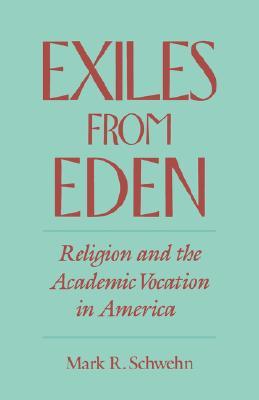
Exiles From Eden by Mark R. Schwehn. New York: Oxford University Press, 1993.
Summary: Schwehn chronicles a shift in the academic vocation from one of formation of the mind and character of students to one of making knowledge, reflecting a change from religiously shaped values to a valuing of formal and procedural rationality, and from an integral sense of self to a multiplicity of “selves.”
This book begins with a group of faculty discussing what occupation they entered on their income tax forms, with responses like sociologist, anthropologist, psychologist and so forth. The author describes the looks of condescension he experienced when he answered “college teacher.” He uses this as an illustration of the shift he believes has taken place in the academic vocation, which he believes is consequential for academics and students alike.
Schwehn argues that Max Weber was both a chronicler and leading exponent of this shift. He recounts his 1918 Munich University address “Wissenschaft als Beruf” as a key turning point in the definition of the academic vocation. Instead of the role of the academic being that of forming the character and intellect of students in a scholarly community, the academic’s vocation became one of “knowledge-making” and an increasingly individual quest to “do one’s own work” interrupted by the instruction of students and the necessities of academic administration. In the process, the religiously shaped virtues of that informed classical university education have been replaced by a kind of “procedural rationality.”
Schwehn observes that voices as diverse as Richard Rorty, Parker Palmer, and Jeffrey Stout have argued for the re-introduction of communities of spirited inquiry in higher education. Schwehn develops this proposal and argues for the importance of religious virtues such as humility, faith, self-denial, and charity. He also contends that all of this be centered by a renewed sense of the academic vocation as that of teaching rather than research, reconceiving research as part of the educative process and honoring excellence in teaching. In a question and answer section he defends and elaborates these proposals against such criticisms as this upholding mediocrity.
The latter part of the book takes a look at the Education of Henry Adams as an example of the life produced by the education system for which Weber advocates. He summarizes this as follows:
The creature Adams registers the disappearance of his Creator by becoming the author of himself—both creator and authority. His wandering spirit seeks, not reunion or reconciliation with the divine, but further estrangement from both divine and the human. In one sad, brave, wonderful book, Adams thereby charts the course of modern alienation by presenting one persona’s repeatedly futile efforts to discover meaning in the world around him. Yet theEducation represents that very “formula of his own” by which the author made sense of his life to himself’.At least, Adams confessed, the Education had succeeded in educating him (109).
Schwehn concludes the book by returning to his title. We are all exiles from Eden. We can either resort to knowledge as power, or, realizing the impossibility of returning to Eden, we can with humility form communities of inquiry to address our finiteness and fallenness. Thus Schwehn argues for the essential difference religious values and virtues can made in the academic vocation.
In the twenty or so years since Schwehn wrote this book it seems that most of the academy has gone further down the Weberian road. By and large it is only religious institutions who have maintained something of the sense of calling Schwehn describes, and even here there are pressures. But the issues he raises have relevance for those who work in non-religious settings, both public and private, who are people of faith. The question he raises for them is whether they will live as people of faith or as people shaped by the “knowledge-making, knowledge as power” paradigm of the post-Weberian age.
Editor’s Note: Thank-you to Bob Trube for sharing his reviews with Emerging Scholars! Bob first posted the above review on Bob on Books. As you take next steps in your vocation and engage conversation with others, I encourage you to delve into Scholar’s Call and Scholar’s Compass. To God be the glory! ~ Thomas B. Grosh IV, Associate Director, Emerging Scholars Network
Bob Trube is Associate Director of Faculty Ministry and Director of the Emerging Scholars Network. He blogs on books regularly at bobonbooks.com. He resides in Columbus, Ohio, with Marilyn and enjoys reading, gardening, choral singing, and plein air painting.

Leave a Reply